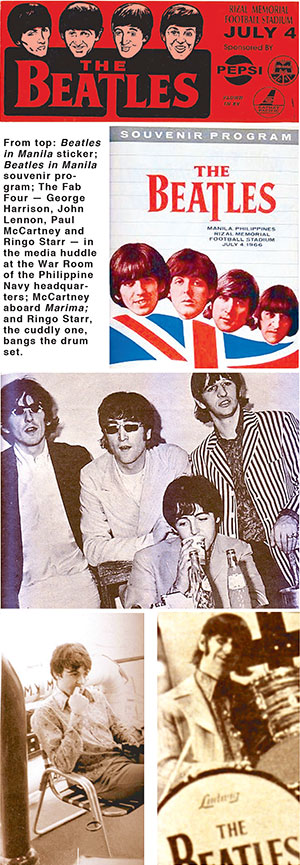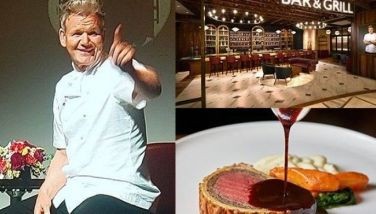The Beatles live and alive in Manila
MANILA, Philippines - In the 1970 bestseller, Future Shock, author Alvin Tofler posits that individuals and entire societies may suffer certain psychological states such as a shock from “too much change in too short a period of time.” Sometimes, the shock requires people to run to escape from its negative capabilities.
Seemingly strange occurrences marked the Beatles’ concerts in Manila from July 3 to 5 back in 1966, an event whose 48th year we are revisiting now. But when investigated in relation to the truths of its milieu, the occurrences turned out to be just madcap manifestations of how Asians and Westerners reacted to future shock — a time of loss of innocence, clash of cultures and changing principles.
Future shock began to occur when the local media quickly called as a “snubbing” the non-appearance of John Lennon, Paul McCartney, George Harrison and Ringo Starr — collectively called the Beatles — in the Malacañang Palace at 11 a.m., on July 4, for a courtesy call on First Lady Imelda Marcos.

Economist, nationalist and media personality Hilarion “Larry” Henares Jr., a source of insider information to this future shock, recalled its circumstances in an exclusive interview with this writer as arranged by granddaughter Cristalle Belo Henares. He rocked and rolled with the Beatles at Rizal Memorial Football Stadium.
“The whole brood was with me. Atom and Ronnie (Henares) were kids back then,” Henares recalled.
A series of events started to unfold when the Beatles had a first taste of Asian culture by performing five concerts at the Nippon Budokan, a sacred national shrine for Japanese killed in World War II. Its use angered right-wing militants who threatened to kill the Beatles. Business manager Brian Epstein required extraordinary measures to secure their safety.
These severe security requirements prompted Ramon Ramos, the Manila-leg promoter, to seek the assistance of the Philippine government and got more than expected — a request for a courtesy call on Mrs. Marcos.
While still in Tokyo, media agent Tony Barrow got a cable from Ramos inviting the Beatles for a lunch appointment with Mrs. Marcos. The problem started when Ramos took the silence as a confirmation of the invitation, a Filipino trait, which for Westerners largely means a negative answer.
The Beatles disliked official functions due to the mishandling received at the British Embassy during their first American tour. A woman clipped Starr’s hair for souvenir and it roughed up the multi-ringed Beatle. This led Epstein to adopt the rule that the Fab Four would not attend political events anymore.
Ramos should have known better but he must have been prevailed by Malacañang. What Epstein was clueless about was that such an act would be considered rude in this hospitality-oriented, predominantly Catholic country.
As the airwaves hummed with “Divina Valencia, Stella Suarez nagbuburles” to the tune of A Hard Day’s Night, Beatlemania reached fever pitch when the Beatles arrived in Manila on July 3. Everybody wanted a piece of the Beatles action if not the moptops themselves. Once the plane touched down at the Manila International Airport, their hard day’s night started to go off.
Ramos took stiff measures to prevent the worst excesses of late-period Beatlemania. But he failed to inform the Beatles management of such security plans and preparations. The din of 10,000 screaming fans reached ear-splitting level when they got a glimpse of the Beatles at the airport looking like jesters instead of the neat-looking quartet with bowl-style ‘dos.
The sight of uniformed gun-wielding military men closing them in alarmed the Beatles, thinking of it as a drug bust. Carrying their cache of recreational drugs in their so-called “diplomatic bags,” they were required by immigration officers to turn them over despite an agreement of exemption. By then, the Beatles had turned from potheads to acidheads, a private issue among them.
At the press conference, Ramos found himself in a big dilemma. Malacañang forced him to promise that he would deliver the Beatles to Mrs. Marcos’ luncheon. But Ramos held back informing the high-strung Epstein about the appointment, afraid he might turn it down. Also into uppers and downers, Epstein was well-known for throwing tantrums.
After the media huddle, the Beatles were herded to the Marima, the private yacht of industrialist Don Manolo Elizalde off Manila’s south harbor. For security reasons, they were supposed to stay there. For the first time, Beatles were cut off from press agent Neil Aspinall, road manager Mal Evans, and Epstein. In their places, cops with guns lined the deck around the cabin.
Due to discomfort made worse by Elizalde bringing 18 high-society friends to party in the yacht, Epstein’s annoyance compounded and wearied down the Beatles. The distress made him confront Ramos. A yelling match ensued until an agreement was reached to billet the Beatles in proper hotel suites.
The Beatles and entourage moved to the Manila Hotel at around 4 a.m. of July 4. McCartney and Harrison occupied Suite 404 while Lennon and Starr the adjacent Suite 405. At the same time, their “diplomatic bags” were returned. This happened 12 hours before the matinee show at 4 p.m.
Mrs. Marcos invited 300 children to the palace to meet the Beatles. When her gun-carrying representatives accosted him at the hotel, Epstein said that it was the first time they heard of the invitation. He refused to wake the Beatles up. He learned later that while in Tokyo, Barrow received the invitation but failed to respond. But Ramos tweaked, reminding him about it upon arrival which was categorically turned down.
After the aides left, Epstein received a call from the British ambassador who urged him to allow the Beatles to attend the party as it is not a good idea to miss it. The ambassador also told Epstein that Pres. Ferdinand Marcos provided all the help and protection they received. Epstein stubbornly refused.
Hospitality defines the Filipino character. Epstein must be clueless that poor Filipinos splurge on fiestas to feed invited and self-invited guests even if they cannot afford the logistics. And inviting a visitor to one’s house to treat him in the best way possible is the grandest expression of this trait.
This sense of hospitality was what Epstein grossly violated when he botched Mrs. Marcos’ invitation. For Epstein, the western cause-and-effect mindset operated: No schedule, we cannot make it. For this disregard for local culture and the Marcoses’ self-importance, the Beatles and party would pay heavily.
“(Norberto) ‘Kokoy’ Romualdez, younger brother of Mrs. Marcos was with the Marcos boys at the Manila Oversees Press Club (in Admiral Bldg. on Dewey Blvd.) He was with his right-hand man, J.V. Cruz and Manuel Collantes, his other right-hand man with Toto Olivera, Guz Gonzales, Napoleon Rama and I,” Henares recounted. “We were making fun of Kokoy because of the Imelda snub when J.V. suggested to organize ‘a lynch mob’ to get even, particularly with their despicable manager, Epstein.”
A gauntlet, a practice invented in the Middle Ages, is two rows of men facing each other with weapons, strike at an individual made to run between them, would be used.
“We arrived at the Rizal Memorial all excited. It was hot and crowded but when the front act started, you know, the likes of Pilita Corrales and Dale Adriatico, we thought we’re going to hear the Beatles sing soon. But this took three hours and when the Beatles performed 11 songs which we could hardly hear due to the screaming, it lasted only 30 minutes. We felt cheated but the kids thoroughly enjoyed,” Henares shared.
Crowd count at both concerts totaled 80,000, making it Manila’s largest drawer. Total ticket sales amounted to $100,000. But there was a big discrepancy in the official count and crowd estimate. Both McCartney and Harrison put the crowd estimate at both concerts at 100,000. The 20,000 difference in ticket sales went to Epstein’s “brown bag” as the proceeds of the undeclared ticket sales were called.
Back at the Manila Hotel, tax collectors demanded from tour agent Vic Lewis, “You owe $80,000.” He was taken by three officers to a police station and two men interrogated him for the longest time, exacting an answer why the Beatles did not attend Mrs. Marcos’ party. Lewis and Ramos later went to the Malacañang press office to explain and offer apologies.
When the Beatles awoke, it became clear to them that they have lost security and their lives started to be miserable. Realizing the full gravity of the disaster he had caused horrified Epstein. Forced to load equipment and luggage in hired taxis, the Beatles had to run for their lives.
“A few hours later, we watched on TV the Beatles run what looked like a gauntlet,” Henares recalled when the Beatles checked in at the airport. But that was just for starters.
“Upon boarding, the Beatles had to rush from the airport to the tarmac at planeside to escape angry Filipinos who kicked, spat, punched and elbowed. Some said it was a spontaneous expression of hatred. Napuruhan si Epstein,“ he summed up.
With Pres. and Mrs. Marcos’ political style not fully manifested in the same way as the Beatles had not been detected as drug smugglers and users, even a vague understanding of future shock would barely save them from the strike and shame of inefficient management with a tax evasion scheme.
- Latest
- Trending



























 Exclusive
Exclusive



